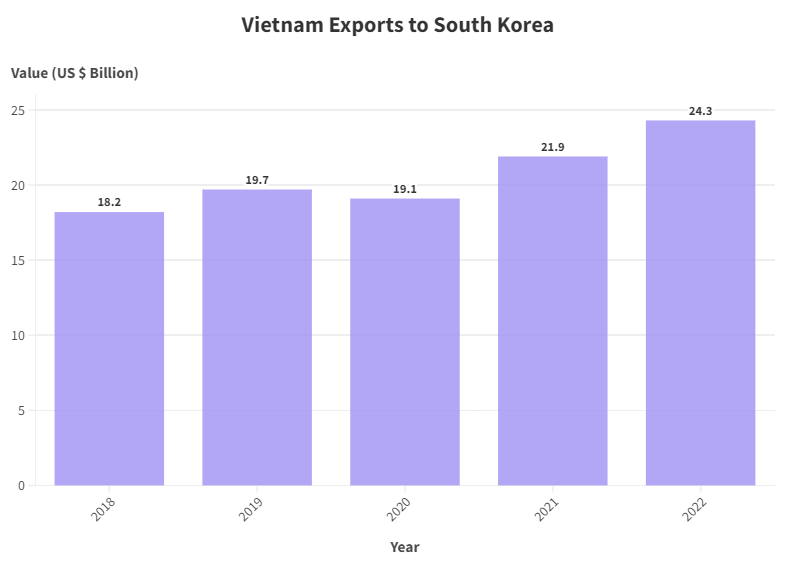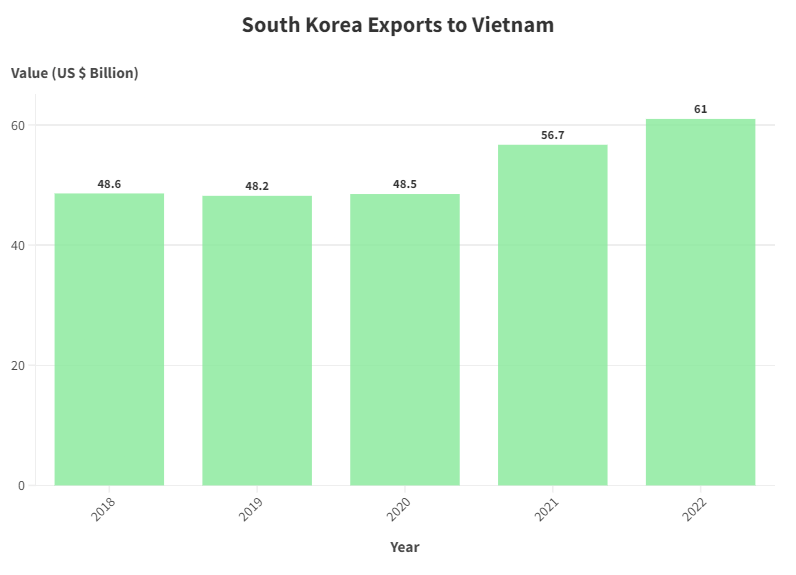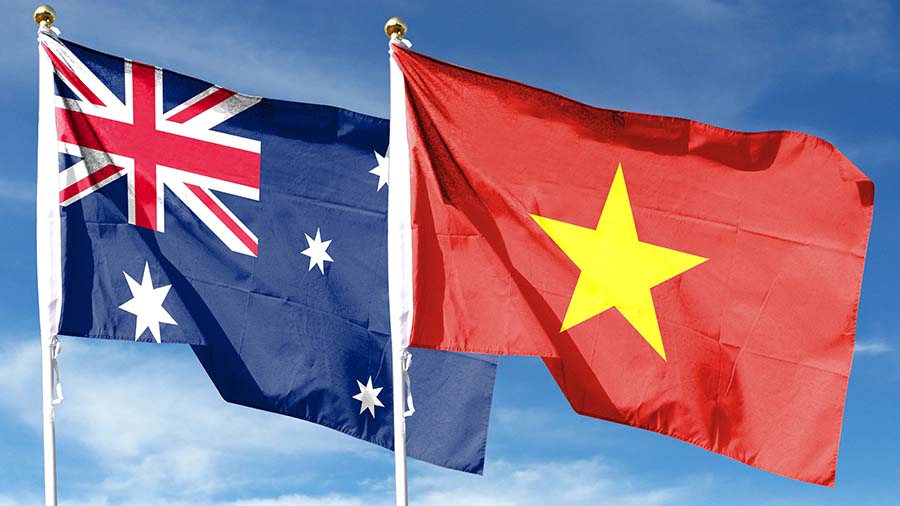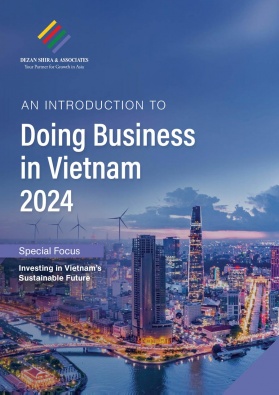Vietnam-South Korea Trade and Investment
In 2023, Vietnam was South Korea’s third-largest trading partner for the second consecutive year, despite a slowdown in trade. Vietnam maintained its position ahead of Japan.
Prime Minister Pham Minh Chinh’s visit to South Korea from June 30 to July 3, 2024, resulted in improved scope for business activities for 10,000 South Korean enterprises in Vietnam. The trip also promoted the development of industrial complexes dedicated to new energy, renewable industries, advanced technology, and artificial intelligence.
Diplomatic relations
After the Cold War, South Korea and Vietnam normalized relations on December 22, 1992. This move came after Vietnam’s 1986 Đổi Mới reform, which aimed to end self-isolation and foster global friendships. Since then, the bilateral relationship has grown rapidly and steadily across various fields.
As strategic partners, the two countries collaborate across various key sectors, including economics, defense, security, health, and the environment. Additionally, they are expanding cooperation on international challenges in the Indo-Pacific region and global geopolitical issues.
Bilateral trade
Over recent decades, the Vietnam-South Korea bilateral relationship has seen significant progress, culminating in the elevation of their diplomatic ties to a comprehensive strategic partnership in 2022. This strengthened partnership is mirrored in their expanding economic relations, with total trade between the two countries growing from US$2 billion in 2010 to US$86.5 billion in 2022. Vietnam and South Korea are committed to increasing bilateral trade to US$150 billion by 2030.
The two-way trade is heavily concentrated on machinery, electronics, and transportation equipment.
According to OEC data, in 2022, Vietnam exported US$15.8 billion worth of goods to South Korea, with the main exports being telephones (US$2.93 billion), broadcasting equipment (US$2.91 billion), and computers (US$1.06 billion). This marked a significant increase from US$187 million in 2017, growing at an annualized rate of 143 percent.
According to World Bank data, South Korea’s exports to Vietnam in machinery and electronic products grew from 25.3 percent in 2010 to 62.6 percent in 2020. Similarly, Vietnam’s exports of machinery and electronics to South Korea increased from 8.4 percent to 53.9 percent over the same period.
Top 5 South Korean exports to Vietnam in 2022
|
South Korea exports to Vietnam |
Value (US$) |
|
Electrical, electronic equipment |
36.16 billion |
|
Plastics |
3.90 billion |
|
Mineral fuels, oils, distillation products |
3.77 billion |
|
Machinery, nuclear reactors, boilers |
3.10 billion |
|
Vehicles other than railways, tramways |
1.75 billion |
|
Source: Trading Economics |
|
Top 5 Vietnamese exports to South Korea in 2022
|
Vietnam exports to South Korea |
Value (US$) |
|
Electrical, electronic equipment |
10.45 billion |
|
Machinery, nuclear reactors, boilers |
2.16 billion |
|
Articles of apparel (not knit or crocheted) |
2.09 billion |
|
Articles of apparel (knit or crocheted) |
1.09 billion |
|
Wood and articles of wood, wood charcoal |
865.17 million |
|
Source: Trading Economics |
|


Compared to May 2023, South Korea’s exports to Vietnam in May 2024, per OEC data, saw a notable increase of US$846 million (19.8 percent), rising from US$4.28 billion to US$5.12 billion. Imports from Vietnam during this period grew by US$118 million (6.13 percent) – increasing from US$1.92 billion to US$2.04 billion.
The year-over-year increase in South Korea’s exports to Vietnam was driven primarily by a substantial rise in exports of mineral fuels, mineral oils, and products, perfumery and cosmetics, and fertilizers.
Similarly, the growth in South Korea’s imports from Vietnam was mainly due to higher imports of non-knitted clothing accessories, machinery, mechanical appliances, and parts, and footwear.
In May 2024, the leading exports from South Korea to Vietnam were:
- Electrical machinery and electronics (US$2.28 billion)
- Mineral fuels, mineral oils, and products (US$294 million)
- Plastics and articles thereof (US$224 million)
- Machinery, mechanical appliances, and parts (US$213 million)
- Cars, tractors, trucks, and parts (US$102 million)
The main imports from Vietnam to South Korea in May 2024 included:
- Electrical machinery and electronics (US$844 million)
- Machinery, mechanical appliances, and parts (US$402 million)
- Non-knitted clothing accessories (US$252 million)
- Footwear (US$132 million)
- Knitted clothing accessories (US$131 million)
In the first half of 2024, Vietnam-South Korea trade turnover reached US$38.4 billion, marking a significant increase from the previous year. South Korea is Vietnam’s third-largest trade partner and second-largest import market, highlighting the importance of their economic relationship.
Investments
South Korea remains a significant investor in Vietnam, with total registered capital reaching US$87 billion. In the first half of 2024, direct investment from South Korea increased by 15.8 percent year-on-year, totaling US$1.41 billion. This growth positions South Korea as the fourth-largest investor among 84 economies in Vietnam. Additionally, South Korea is Vietnam’s third-largest export market.
The Vietnam government has encouraged South Korean firms to expand their investments in the country, particularly in frontier sectors like advanced technology, electronics, semiconductors, AI, renewable energy, as well as human resource development.
Samsung’s substantial presence in Vietnam includes an investment of US$22.4 billion and employment of 90,000 people. Moreover, 310 Vietnamese firms are part of Samsung’s supply chain, and its R&D center in Hanoi employs 2,500 staff.
During his visit, Prime Minister Pham also discussed Vietnam’s electric vehicle sector with Hyundai Motor, which has invested more than US$410 million in the country. He urged Hyundai to deepen its commitment to green transportation and integrate more local suppliers into its supply chain, aiming to bolster Vietnam’s domestic industries and advance technological capabilities.
Prime Minister Pham also extended an invitation to Lotte Group to participate in Vietnam’s initiatives for smart city development and sustainable tourism, underscoring opportunities for urban sustainability and tourism sector growth.
Meanwhile, South Korea’s Hyosung Corporation has revealed plans to expand its presence in Vietnam, including the establishment of a new data center in Ho Chi Minh City.
Bilateral agreements
Various bilateral agreements have laid a solid foundation for Vietnam and South Korea to strengthen their economic cooperation through increased trade and investment flows.
Vietnam-Korea Free Trade Agreement
The Vietnam-Korea Free Trade Agreement (VKFTA), signed on May 5, 2015, and effective from December 20, 2015, enhances economic cooperation between Vietnam and South Korea, offering greater incentives than the ASEAN-Korea FTA (AKFTA). It aims to promote trade, services, and investment without replacing AKFTA. The VKFTA agreement sets clear rules of origin for goods, requiring specific criteria to be met, and includes provisions for special goods and Certificate of Origin exemptions for lower-value imports.
Commitments on trade in services ensure National Treatment (NT) and Most Favored Nation (MFN) treatment, along with additional sector openings compared to WTO and AKFTA commitments. Investment protections include NT and MFN treatments and mechanisms for settling disputes through administrative courts and arbitration.
Double Taxation Avoidance Agreement
The Double Taxation Avoidance (DTA) Agreement between Vietnam and South Korea plays a crucial role in facilitating economic cooperation and investment between the two countries. By providing clear guidelines on tax matters and preventing double taxation, the agreement creates a stable and predictable tax environment that benefits both nations and their taxpayers.
The DTA came into force on September 11, 1994, and covers a wide range of tax-related issues to ensure that individuals and enterprises are not taxed twice on the same income in both countries.
The agreement applies to persons who are residents of either Vietnam or South Korea or both. It ensures that residents of these contracting states are subject to the provisions of the agreement, and it applies to all taxes on income imposed by either country. Specifically, it includes:
- In Vietnam: personal income tax, profit tax, and profit remittance tax.
- In South Korea: income tax, corporation tax, and inhabitant tax. The agreement also extends to any identical or substantially similar taxes imposed after the agreement’s signing.
Benefits of the Agreement:
- Prevention of double taxation: The DTA ensures that income earned in one country is not subject to double taxation, fostering a favorable investment climate.
- Tax certainty: The agreement provides clear rules and definitions, reducing uncertainties and potential disputes between tax authorities and taxpayers.
- Economic cooperation: By removing tax barriers, the DTA promotes cross-border trade and investment, enhancing economic ties between Vietnam and Korea.
- Preventing tax evasion: The agreement includes measures to prevent tax evasion, ensuring that taxes are duly paid in the appropriate jurisdiction.
Comprehensive Strategic Partnership
In 2002, Vietnam and South Korea upgraded their relationship to a “comprehensive partnership in the 21st century”. This was further elevated to a “strategic cooperative partnership” in 2009 and most recently to a “comprehensive strategic partnership” in December 2022, during Vietnamese President Nguyen Xuan Phuc’s visit to Seoul.
The two countries have set a target of increasing bilateral trade turnover to US$100 billion by 2025 and US$150 billion by 2030.
This partnership makes South Korea the first middle power to have such a partnership with Vietnam. This upgrade reflects South Korea’s significant role as a partner for Vietnam. Under this framework, both countries aim to intensify collaboration in maritime security, national defense, and the defense industry. Annual bilateral defense dialogues since 2012 and cooperation in maritime security and arms production have been key areas of focus.
Conclusion
Looking ahead, both Vietnam and South Korea are poised to continue to complement their respective economic and industrial strengths and expand their cooperation in frontier sectors, such as sustainability, AI, renewable energy, and smart cities. As the two countries navigate geopolitical complexities, Vietnam and South Korea’s strategic ties will serve as a stabilizing force, fostering mutual prosperity and contributing to regional development.
About Us
Vietnam Briefing is published by Asia Briefing, a subsidiary of Dezan Shira & Associates. We produce material for foreign investors throughout Asia, including ASEAN, China, and India. For editorial matters, contact us here and for a complimentary subscription to our products, please click here. For assistance with investments into Vietnam, please contact us at vietnam@dezshira.com or visit us at www.dezshira.com.
Dezan Shira & Associates assists foreign investors throughout Asia from offices across the world, including in Hanoi, Ho Chi Minh City, and Da Nang. We also maintain offices or have alliance partners assisting foreign investors in China, Hong Kong SAR, Dubai (UAE), Indonesia, Singapore, Philippines, Malaysia, Thailand, Bangladesh, Italy, Germany, the United States, and Australia.
- Previous Article Eco-Industrial Parks in Vietnam: Implementation and Key Goals
- Next Article Vietnam’s Economic Performance in H1 2024: Key Indicators and Growth Forecast
































